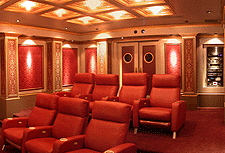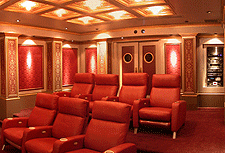


In my career in ultra-high-end audiophile retail at Christopher Hansen Ltd. in Beverly Hills and Mark Levinson's Cello Music and Film Los Angeles I was blessed to work with some of the best audio-video demo artists of all time. Anybody who thinks a client can just plunk The Who "Live at Leeds" in the CD player on your Levinson/Transparent/Wilson audiophile system and thinks that he or she is getting the order has another think coming. Without question, there is a time and a place for the consumer to listen to his or her favorite music on a top-performing system. However when you go out for a test drive in, say a brand new Ferrari in California, the salesman always gives it a few runs through the gear box to give you an idea of what you are getting into on the test drive. Then the salesman turns over the wheel to you when you are all excited and at the perfect place on the road for you to get the most out of the car, leaving you a giddy mess and ready to do something downright silly with your money. And yes, I just drove one and it was amazing and no, I didn't buy the car but my very dear friend and former Christopher Hansen Ltd. client did, thus proving that the demo truly matters.
At Cello Los Angeles in the mid-1990s, Mark Levinson was normally in New York selling tons of high end gear to some of the most powerful and interesting people on the Upper East Side and beyond. When I got to work with him in person in both New York and L.A., I learned so much about the way he engages people into acoustical music. The Cello system at the time was the most expensive and exotic system in the audiophile world. It had powerful class-A operational amps, ultra-high-efficacy speakers (97 dB) and could really rock. Mark always had master recordings of music that were recorded using special mics and high end electronics. In Mark's arsenal, he had on DAT tape Indian tabla drums would snap and pop with live acoustical energy in ways that nothing on CD or anything you would hear at an audiophile shop would do. Forget vinyl - these dynamics don't come from LPs and they never did. Mark would play recordings of exotic and beautiful instruments that you likely have never heard in your life. They would shine musically with a three dimensionality that allowed me as a salesman to know that even if the client went to, say Ambrosia or LA Audio Video to hear other very high quality audiophile gear - that they wouldn't get that religious experience. We were selling audio religion as much as audio gear back in the day. We actually got our clients going out at night to hear more live music. We got them buying August Forster pianos and Martin guitars. We inspired them to play and record music with their kids. We were doing things that went beyond audiophila, that were both fun and profitable.
Roll the tape forward to today and the art of audio sales is gone for the most part. In fact, thanks to the likes of Circuit City and Best Buy, commissioned salespeople who make their living being excellent and expert at selling audio and video are now unemployed. The idea that top selling commissioned salespeople "made too much money" is the single best reason for Circuit City's Chapter 7 failure. Now the pressure is on the manufacturer to pre-sell the product so that a big box clerk or warehouse checkout girl can simply take an order, which to be clear is very different than actually making or earning a sale. This is one of the most important reasons to support independent AV stores that spend the money and effort to showcase high end audio-video gear. While it's possible to save money buying some products (used on Audiogon.com or at Costco), you lose the magic of learning and experiencing high end and high performing equipment which is as much of the part of the process as building a top performing AV system.
My direct boss at Cello in Los Angeles back in the 1990's is an actor named Joe Cali. He is best known for his work in Saturday Night Fever as one of Travolta's New York buddies in the movie. But Joe Cali's true calling is as a pure salesman. As the late Don Bouchard once said "Take all of you hot shit salesmen like Levinson, Del Colliano, Chris Hansen, Andy Singer, Mark Goldman, Frank Betz or any of you where the deal was you got a bullet in the head if you didn't close the deal - each and every one of them would pick Joe Cali to close the deal." In many ways Don was right as Cali's pitch was different than Mark Levinson's in that he could - like an actor - adapt like chameleon to the musical and theatrical tastes of a client and find what make them tick. He got them emotional. He taught the listener what to listen for like the slight hum of Stevie Ray Vaughn's Fender Twin Amp in the intro of his version of the Hendrix classic "Little Wing" or to look for the ants crawling on the edge of a basket of berries on Fried Green Tomatoes. He taught customers to be enthusiasts and in the process - he made himself a millionaire. What I struggle to forgive him for is making me as the college kid and music student at The University of Southern California is making me run down the street to the famous Tower Records on Sunset Boulevard in West Hollywood and buy every Kenny G record before Mr. G came into the showroom for a celebrity demo. This was a damaging experience for my young ego but you know what - Joe closed him. You could bet on that as he expected an above fifty percent close ratio for anyone selling in the store which meant Joe or myself.
Today's HDMI-based systems make doing a slick demo in a store or even for your friends at home much more difficult than in the past. HDMI is slow and glitchy to be polite and younger audiences are so used to the immediate action of a Blackberry or their laptop that they rarely have the patience to sit-down for an artful demo. My good friend at Paradigm was telling me that they actually bring four or five Blu-ray players to each tradeshow to do their active demos which are among the best in the AV business. They set the disc to play on a perfect loop for each track they want to play and simply switch from input to input to keep the cadence of the demo moving along. I think this is something that all "showing" retailers should consider with at least two players per system. For consumers, permanently recording some key shows on say a DVR or toggling from Apple TV to Xbox 360 to Blu-ray keeps the show moving when you are showing your neighbor the latest improvements in your home theater rig.
Another key detail of doing an excellent music or movie demo is to keep it short. For music, there is a rule - never go past 1:30 and roll down the volume smoothly at the first chorus. Much like Thomas Keller at The French Laundry says - you want to leave the patron (or your buddy from college who likes movies) wanting just one bite more of each dish. Movies demos can go a little longer but be wary of losing the point of why you are showing the movie. Be sure to pre-sell the scene by alerting people to the shotgun blast in the bank robbery opening scene of The Dark Knight. People need something to focus on unless your goal is to let them fly blind into a scene or musical track.
The art of the demo doesn't have to die because of the rise of the warehouse store. The fact that flat HDTVs are something that nearly everybody can afford today only means that there are more people to teach about the high art of audio and video. Most have never heard what a really good surround sound system can do. Most have no idea what video calibration does. Perhaps you will show them and earn a new client for the specialty AV business?